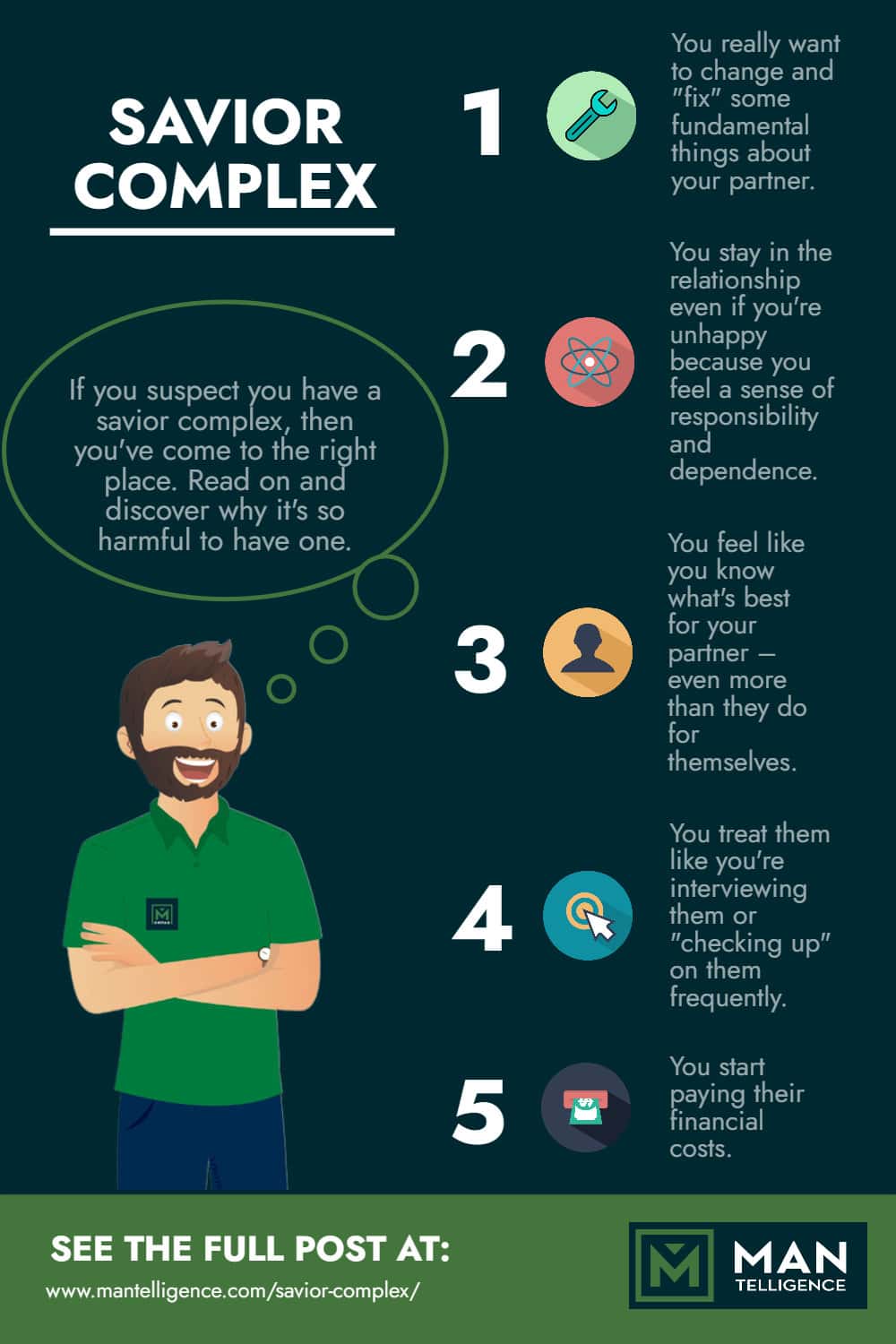
via: Pexels / Ivan Samkov
Do you understand what a savior complex is? In this article, we'll explain what it is.
A savior complex, otherwise known as white knight syndrome, is what develops when a person's savior mentality becomes dangerously obsessive. What starts as a good thing, such as someone with compassion wanting to give healing to others, can become self-damaging when one ignores the consequences. As a dating and life coach, one featured in Lifehack and UpJourney, I have dating tips in my 20s and experience in deciphering emotions.
Ready? Let's begin.
Contents
What is a Savior Complex?

via: Pexels / Pavel Danilyuk
A savior complex is a psychological construct characterized by an unchecked obsession with solving people's problems and "saving" them from painful situations, to the detriment of one's sense of self and mental health.
Essentially, the person makes it their mission to "save" others, ignoring all the consequences of obsessively trying to better other peoples' life.
It may start with a good intention at first - wanting to come to the rescue of a loved one, for example - but eventually, the feeling of being in a position of power and moral superiority can burrow deep inside until it becomes a deep-seated craving. Eventually, it stops being a good thing as the person comes to seek out people facing oppression or people in dire straits.
The person becomes obsessed with trying to help them… and not for the best of reasons, or even to the point where they sacrifice their own mental health, stressing themselves out trying to solve people's problems, problems which aren't even theirs.
Characteristics of Someone With a Savior Complex

via: Pexels / Kindel Media
As this article might tell you, a savior complex is dangerous for someone to have. When someone grows addicted to the feeling of being able to help others, they might start searching for troubled people to "help," even if it might do more harm than good. In the worst cases, they might even try to create the problems they want to fix. As you can imagine, it's a big turn off for women and can be why a relationship grows sour. If you're afraid you're developing a savior complex or suspect your partner has one, look for these important characteristics. If more than one applies, there's a good chance they have a savior complex.
1. You really want to change and "fix" some fundamental things about your partner.

via: Pexels / Mizuno K
When you're obsessed with trying to help people, you start wanting to "fix" people. You begin to look at people exclusively for their flaws - or even perceive some harmless things as things you must fix. This even applies to your partner. Sometimes, you even try to play as their therapist and force your partner or loved one to change when you should instead love them as they are. So, if you're obsessed with trying to make your partner "better" to the point that it damages your healthy relationship, there may be a savior complex in play.
2. You stay in the relationship even if you're unhappy because you feel a sense of responsibility and dependence.

via: Pexels / cottonbro studio
A savior complex isn't just bad for your partner. It can potentially harm you just as much. If you recognize you're in a toxic relationship but refuse to leave it, either out of a sense of responsibility, or the belief that you can fix it, you might be hurting yourself in the long run. Forcing yourself to stay in an unhappy relationship is never a good thing, no matter how much good you believe you can do them. If you've tried to maintain a relationship with a person who refuses to change their ways, it's better for both of you to separate. It's just beating a dead horse if you try to push it for any longer.
3. You feel like you know what's best for your partner – even more than they do for themselves.

via: Pexels / Alex Green
Saving and helping people puts you in a position of moral superiority, which may lead to the misconception that you automatically know better. Then, you start to think that you know what's best for others - no matter the evidence suggesting you actually don't. If you start thinking you know what's best for your partner in all situations, without even bothering to make sure, you'll be looking down on them instead of supporting them. That's never a good thing for a healthy relationship.
4. You treat them like you're interviewing them or "checking up" on them frequently.

via: Pexels / Kampus Production
When you see yourself as a savior, you might start seeing yourself as the only person who can provide healing to a wounded heart. But to heal others, you take in pain they've felt, empathize with them, and try to solve their problems as if they were your own. Eventually, that sort of emotional strain can numb a person. It eventually leads to them seeing people in pain not as people, but as patients. If you start seeing people as patients to be healed, you're dehumanizing them. If you see people only as the sum of their problems and how you can help them, take a step back. You need to see people as people, not as targets for healing.
5. You start paying their financial costs.

via: Pexels / Cup of Couple
One way to "save" a person is to rescue a person financially. In the same way solving another person's problems makes you feel appreciated, helping another person with their financial problems does the same. But obviously, you can't support a person forever, let alone multiple people. If you find yourself paying for people more than you should, you're not saving them - you're just giving them someone to mooch off of.
6. You're working overtime while they sink deeper.

via: Pexels / Pavel Danilyuk
We all eventually learn that not everyone can help people with certain problems, especially if you aren't a professional. You might encounter a problem so big that it forces the person facing it to sink deeper into sadness and depression. And as you try to fix it only to realize you're not able to fix it, you force yourself to work overtime to try and cope. Eventually, you have to realize that you're unable to fix them. Trying to force yourself to solve that problem will only make it worse for both of you. At that point, it's time to seek proper professional help.
7. You look after your partner so much you don't leave enough time for yourself.

via: Pexels / THIS IS ZUN
This is the biggest and most common pitfall someone with a savior complex experiences: devoting yourself so much to helping others that you neglect yourself. If you haven't cared for yourself lately, both mentally and physically, while taking care of other people, you've ironically become the person in need of saving.

via: Mantelligence
Share This Image On Your Site
Causes of Savior Complex

via: Pexels / MART PRODUCTION
Not everyone develops a savior complex for the same reasons. Like any complex, an event usually triggers its development - this trigger can be any number of things. We'll list a few possible causes below, but bear in mind that just about any event can give birth to a savior complex.
They like the feeling of being able to help people.

via: Pexels / Polina Tankilevitch
One of the most common reasons people develop a savior complex is that they like the feeling of appreciation and moral superiority they get when they help people, possibly even more than they like the act of helping people in the first place. If they helped someone in a big way and get showered in praise and appreciation, especially if they haven't experienced it before, that could trigger an eventual savior complex.
They feel lonely and only know how to connect to people by helping them.

via: Pexels / Alex Green
People with low-self worth and/or poor communication skills may seek others' approval because they feel lonely. If they don't know how to connect with others normally, they may start to think that the only way to feel less lonely is to be helpful. And if they succeed by doing that where other methods have failed, they may start believing that the only way to connect is by helping others.
They see helping other people as a way to gain something.

via: Pexels / Andres Ayrton
Helping other people should be for its own sake, but some people see it as a way to gain something - whether it's as harmless as gaining a friend or as conceited as earning a favor for later. So, some people with a savior complex see helping people as a game - winning something is what they care about rather than being helpful.
Savior Complex vs. Martyr Complex - What's the difference?

via: Pexels / SHVETS production
The main difference between a savior complex and a martyr complex is how important the idea of sacrifice is. For those with a savior complex, the goal is to be able to help as many people as possible while avoiding as much self-sacrifice as possible. But for those with a martyr complex, sacrifice is necessary. Saviors want to be seen as an unflinching pillar of support. On the other hand, martyrs want to be remembered as the person who sacrificed so much for others' happiness. So, while both complexes can hurt the people who have them, only one of the two makes it intentional.
How To Avoid Developing A Savior or Messiah Complex

via: Pexels / Na Urchin
As you're now aware, developing a savior or messiah complex is dangerous. That's why, to prevent the harm that comes with them from happening, we must avoid them in the first place. But how? Here, we'll list some ways you can avoid developing these complexes.
1. Be content with what you accomplished.

via: Pexels / Yaroslav Shuraev
The most common trigger for developing a savior complex is helping someone, usually in a way that gets you a lot of appreciation. When such a good thing happens, you start wanting to do it more, to be even more appreciated. To avoid falling into this, you should be content with what you've accomplished. Don't start thinking you have to do more just to be appreciated.
2. Don't put too much importance on the approval of others.

via: Pexels / Mikhail Nilov
While it's okay to want approval, you shouldn't put too much importance on it. Making it the thing you want most will only put you on the path of pushing yourself harder and harder to try and get it. Spend too long doing that, and you'll end up trying to help people to the detriment of your own mental health. So, while it's okay to want someone's approval, you should earn it naturally, by being yourself.
3. Don't try to help people all by yourself.

via: Unsplash / Priscilla Du Preez
No man is an island, and no one person can solve every problem. Trying to solve everyone's problems by yourself may lead you to believe only you can fix anything and may set you on the path to developing a savior complex. Rather than try to do everything yourself, try asking for others' help. Being surrounded by people who also want to help can stop you from becoming a lone wolf savior.
Frequently Asked Questions

via: Pexels / Dziana Hasanbekava
Have some more questions about savior complexes I didn't cover in this article? I've answered some frequently asked questions down below, so read on.
Is having a savior complex a terrible thing?
Ironically, despite everything I said up until now, it's not the complex itself that is the terrible thing. Wanting to help people is an honest and pure intention. It's the lengths we go to in trying to help people is what's terrible; ironically, we hurt more than we help if we take helping others to extremes.
Does someone with white knight syndrome last in a relationship?
While a white knight may earn brownie points early in a relationship, not everyone is a princess who needs saving. A relationship built only on wanting to come to someone's rescue has little room for actual love. If you're constantly saving someone, can they ever learn anything about the real you? Not only that, there are other types of relationships out there - people who practice relationship anarchy make it so that a white knight has little place in it.
How has social media furthered the savior complex?
Social media has made it so that the people who are oppressed and troubled have more of a voice, meaning that more people, especially those with savior complexes, can hear it. Ironically, social media has proliferated the idea of helping people in need... and in some cases, even to the point of harming the people doing the saving in the first place.
How do you know if you have a savior complex?
The easiest way to know is to look at what you're trying to do or would do and see if those things are being put to extremes. Are you helping people while neglecting yourself? Will you do anything to help people? Are you doing it for the wrong reasons? These questions will reveal whether you have a savior complex or not.
Is the white savior complex similar to the savior complex?
Both the savior complex and the white savior complex are about the same, but with a distinction: a savior complex can develop in anyone. Still, a white savior complex specifically targets white people. The white savior thinks that, because they are white, they are much more capable and talented than people of other races, and thus ironically looks down on the people they're trying to save.
More Interesting Articles To Explore
Was this article interesting and informative? Look through some of our related posts to see articles like this one.
- We've all asked ourselves this question: How do you be a man? Check this article to see how we answer it.
- Another dangerous thing to have is nice guy syndrome: read on to find out if you're just a nice guy or have nice guy syndrome.
- Finally, would you like to know the signs you're an alpha male?
In Conclusion
A savior complex can be a serious problem, not only for the person who has it but also for the people whom the person tries to save. After reading this article, you should now know just how severe it can be. For those who suspect they have a savior complex, there is value in backing off and letting others handle it - so don't take it all on yourself to help others.
And before you go, as your life and dating coach, might I interest you again in some dating tips in my 20's?








